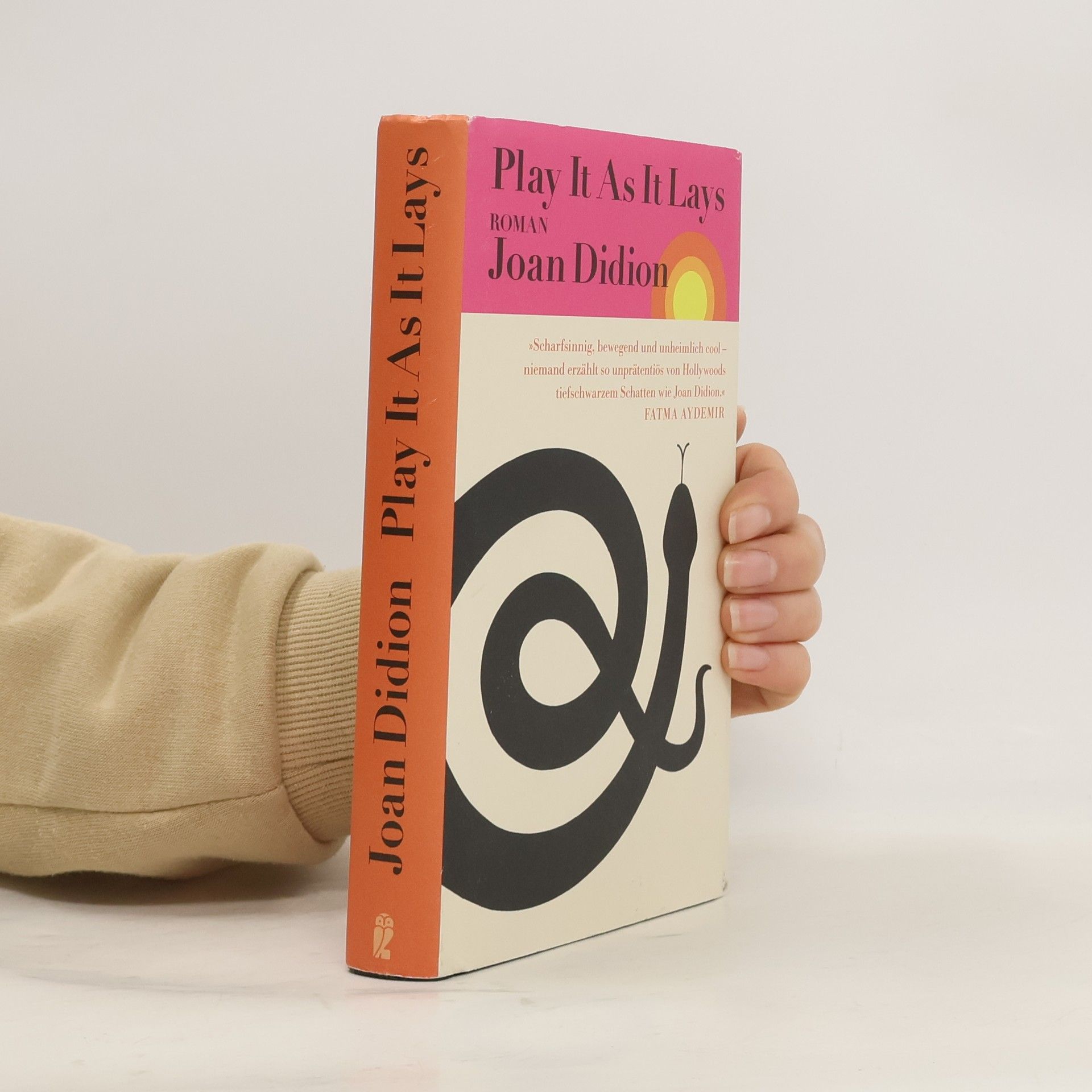The collection features Joan Didion's final four nonfiction works, showcasing her poignant reflections on grief, identity, and the American experience. "The Year of Magical Thinking" delves into her personal journey through loss, while "Blue Nights" explores themes of aging and memory. "South and West" offers observations from a road trip, and "Let Me Tell You What I Mean" presents a series of essays that highlight Didion's keen insights and distinctive voice, making this omnibus a significant addition to her literary legacy.
Joan Didion Book order (chronological)
Joan Didion is celebrated for her novels and literary journalism. Her works delve into the disintegration of American morals and cultural chaos, with individual and social fragmentation serving as overriding themes. A pervasive sense of anxiety or dread underscores much of her writing, reflecting a sharp observation of the human condition.







The collection showcases Joan Didion's profound exploration of grief, identity, and American culture through her final four nonfiction works. In "The Year of Magical Thinking," she confronts personal loss, while "Blue Nights" reflects on her daughter's passing. "South and West" offers insights into two distinct American regions, and "Let Me Tell You What I Mean" compiles her notable essays. Didion's writing serves as a lens to understand her thoughts and the world, demonstrating her exceptional talent as a prose stylist and social commentator.
Joan Didion: Memoirs & Later Writings (Loa #386)
Political Fictions / Fixed Ideas / Where I Was from / The Year of Magical Thinking (Memoir & Play) / Blue Nights / South and West
- 855 pages
- 30 hours of reading
The collection features the powerful and haunting works from the later phase of a renowned writer's career. This definitive three-volume edition by the Library of America includes the final seven books, showcasing her unique voice and profound insights. Readers can expect a deep exploration of themes such as memory, loss, and the complexities of modern life, reflecting the author's unmatched literary talent and emotional depth.
Joan Didions beeindruckendes Debüt erzählt von Everett McClelland, der den Liebhaber seiner Frau erschießt, um seine Ehe zu retten. Dies markiert den Höhepunkt einer jahrzehntelangen Rivalität zwischen mächtigen Farmerfamilien im Sacramento Valley und entfaltet eine archaische Familiengeschichte in der rauen Schönheit Kaliforniens.
Inez Victor, verheiratet mit einem US-Senator, lebt ein glamouröses Leben auf Hawaii, während sie heimlich eine Affäre mit einem Waffenhändler hat. Hinter dem Schein von Erfolg verbirgt sich eine Familientragödie, geprägt von Affären und Lebenslügen.
Play It As It Lays
Roman | Ein Klassiker der feministischen Literatur - »Scharfsinnig, bewegend und unheimlich cool.« Fatma Aydemir
Ein flimmernder, schonungsloser und geradezu unheimlicher Roman über die Suche nach dem richtigen Leben im falschen Maria Wyeth ist eine Modellegende und ein Filmstar. Doch im Los Angeles der Sechzigerjahre verliert sie die Kontrolle über ihr eigenes Leben. Ihre geistig beeinträchtigte Tochter wird ihr weggenommen. Ihre zerrüttete Ehe ist nicht mehr zu retten, und ihre katastrophalen Liebesaffären und vermeintlichen Freundschaften bieten wenig Trost. Jeden Morgen um halb 10 Uhr steigt sie in ihr Auto und donnert über den Highway – auf der Überholspur und mit laut aufgedrehtem Radio, bis sich „irgendwo im Nirgendwo, wo der makellos brennende Beton einfach aufhört“ das Gefühl der Leere verflüchtigt. »Scharfsinnig, bewegend und unheimlich cool - niemand erzählt so unprätentiös von Hollywoods tiefschwarzem Schatten wie Joan Didion.« Fatma Aydemir
Joan Didion: What She Means
- 128 pages
- 5 hours of reading
Exploring Joan Didion's life and work, Hilton Als presents a chronological mosaic that captures the complexities of her identity as a writer influenced by both coasts of America. The narrative reflects Didion's critical yet affectionate view of her native California and her insightful observations on the political landscape from New York. The book features contributions from 50 artists across various mediums, alongside three previously uncollected texts by Didion, enriching the understanding of her impact on literature and culture.
Joan Didion: The Last Interview
- 192 pages
- 7 hours of reading
"Some writers define a generation. Some a genre. Joan Didion did both, and much more. Didion rose to prominence with her nonfiction collection, Slouching Towards Bethlehem, and she quickly became the writer who captured the zeitgeist of the washed-out, acid hangover of the 60s. But as a bicoastal writer of fiction and nonfiction whose writing ranged from personal essays and raw, intimate memoirs to reportage on international affairs and social justice, Didion is much harder to pin down than her reputation might suggest. This collection encompasses it all, in conversations that delve into her underappreciated mid-career works, her influences, the loss of her husband and daughter, and her most infamous essays. Far from the evasive, terse minimalist that has come to dominate the image of Joan Didion, what this collection reveals is a warm, thoughtful woman whose well earned legacy promises to live on for readers and writers for many generations to come."-- Provided by publisher
Was ich meine
»Ein einzigartiges Werk, das einen immer wieder regelrecht sprachlos zurücklässt.« Daniel Schreiber
»Ein weiterer Gewinn einer unverzichtbaren Autorin.« Kirkus Review Zwölf zentrale und zeitlose Essays aus dem frühen Werk der Schriftstellerin zeigen Joan Didion als brillante Zeitzeugin. Von ihrer Bewunderung für Hemingways Sprache bis hin zur Ergründung ihrer eigenen Selbstzweifel, als junge Frau nicht in Stanford angenommen worden zu sein, ist jeder Text ein intellektuelles Vergnügen. Von der Autorin selbst ausgewählt lernen wir in ihnen ihr Amerika kennen und die junge Frau, die auf dem Weg ist, eine Ikone der amerikanischen Literatur zu werden. Ihre Essays sind prägnant, elegant und verblüffend vorausschauend. »Je kürzer ihre Essays sind, umso bemerkenswerter erscheinen sie mir: Ein Satz von Didion ist immer ein Wunderwerk magischen Denkens.« The Guardian
Das weiße Album
Der Klassiker des 20. Jahrhunderts, der die Literaturlandschaft bis heute prägt
»Diese Sammlung kritischer Reportagen über die späten Sechzigerjahre in ihrem Heimatstaat Kalifornien, machte Didion zum Star des New Journalism.« Süddeutsche Zeitung Das weiße Album ist ein essenzielles Werk und ein Klassiker der amerikanischen Autobiografie. In ihren Essays untersucht Joan Didion mit der ihr eigenen Klarsicht Akteure, Schlüsselereignisse, Bewegungen und Trends der Sechzigerjahre – darunter Charles Manson, die Black Panther und Shopping Malls. Aus einer intellektuellen Verstörung heraus schreibt sie über den American Dream, einen Traum, der auch im Scheitern nichts von seiner Faszinationskraft eingebüßt hat.

